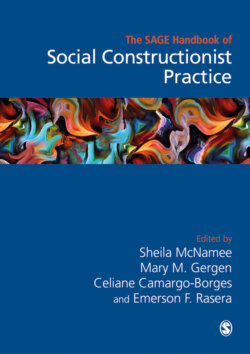Читать книгу The Sage Handbook of Social Constructionist Practice - Группа авторов - Страница 140
На сайте Литреса книга снята с продажи.
Zooming Out: Assemblages of Practices
ОглавлениеWe used an assemblage approach to attend to and identify the conditions and influences under which situated elements commingle and develop into socio-material practices, all occurring within and as part of social worlds. Given Tom Jackson's social worlds, and our interview with him, we identified the following conditions and influences that likely converged and commingled to facilitate excessive gambling (Figure 10.2): Neoliberalism, media, gambling industry, government/political system, current economy, work/employment, health and mental health, and social network. For the purposes of this chapter, we focused on conditions and influences most related to Tom Jackson's casino gambling, which directly attend to socio-material elements. However, conditions such as social network (i.e., recent loss of parents, lost connection to friendships due to working night shifts) and health and mental health (i.e., chronic pain and depression) are also major influences in the assemblage.
Figure 10.2 Zooming out: assemblage
Relevant to casino gambling are neoliberalism, technology, media, the gambling industry, and the political system/government. North America embraces a neoliberal ideology which privileges independence, capitalism, higher socioeconomic status, and, arguably, excessiveness. This translates to a desire to become and appear wealthy, often through excessive spending and consuming (e.g., cars, jewellery, clothing, fancy dinners, going to Vegas). The gambling industry is both a product of, and contributor to neoliberalism. The aim of the gambling industry is to maximize profit, while also promising the gambler the potential to win a jackpot (money is material). This industry uses technology in their materials to engineer player practices and experiences to perpetuate further play (Schüll, 2012). Casinos are designed to be exciting (lights and bells), glamorous, and disorienting in time and space, to keep consumers engaged in the practices. Video lottery terminals (VLTs) are also designed to be ‘addictive’, creating a trajectory towards continuous gaming productivity by ‘accelerating play, extending its duration, and increasing the total amount spent’ (Schüll, 2012, p. 52). This fits clearly with Tom Jackson's socio-material description of the casino as a ‘different world’ filled with excitement, fun, lights, and sounds.
The current economic system creates a tension with the neoliberal ideal. In a neoliberal system, as smaller numbers of people become increasingly wealthy, more become economically disadvantaged without options to progress. Those who are economically disadvantaged are likely to be less satisfied with their ‘reality'; working very hard, in jobs they dislike, and earning less than required for comfort, let alone match the ideal performed in media. However, those who are economically disadvantaged are still under the influence of the neoliberal ideal, which creates conditions to accumulate wealth outside of their regular jobs; gambling at a casino is very lucrative. In the case of Tom Jackson, he talked about his experience of being in the casino as a ‘different world’, with lights, sounds, and the potential to win money to make the pain and depression of his daily reality (Figure 10.3) ‘go away.’
